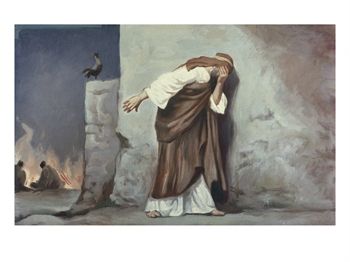What is the connection that drew you to your church? Was it that there were other moms with kids? Other empty nesters? Other people of the same race? Maybe someone else there is from the same hometown and that connection made you feel at home.
We all long for strong community. We're designed by a trinitarian God who has existed in community eternally. We need fellowship and connection. We need it in order to make it through the day. It is God’s means of sanctification.
But we often confuse strong similarity for strong community. Commonality never promises community.
Luke’s account of Peter’s denial during Passion week shows this to us.
Peter was asked if he was associated with Jesus three times. Each accusation or inquisition decreased the level of commitment that Peter had to give to Jesus. . See the questions in order from Luke 22.
“This man was also with him.” Luke 22:56
“You are also one of them.” Luke 22:58
“Certainly this man also was with him, for he too is a Galilean.” Luke 22:59
See what happened there? Peter was asked if he associated with Jesus directly. But he denied it. He was asked next if he was associated with the larger circle of disciples and followers (a less direct association). But he denied it. Then, finally, he was given the opportunity to claim to be just a fellow Galilean. He denied that too.
The fact that Peter and Jesus both hailed from Galilee didn’t keep them together. That commonality meant nothing when it came to faithfulness to Jesus. We might think that in this moment their hometown connection might mean something. Maybe Peter would at least admit where his was from.
Pick your social connection. We will do the same. If our church is the place that we go because other people crochet like us, or are in soccer league, or have kids too, or are in our line of business, we can expect to have weak community there.
When crisis come commonality alone won’t keep a church united or get through tough times. Only commitment to the gospel and doctrine that accords with his his teaching truly unites a church. That can be a church of black and white, rich and poor, laborers and leaders, and more. From the outside it will look like a strange of community of misfits. But in truth it will be stronger than death itself.
What does this teach us? We cannot depend on some cultural affinity to create or sustain strong community in our local church. Peter had the opportunity to claim Jesus that way. "Are you not a Galilean also?", he was asked. Are you not from Austin too? Aren’t you guys in the same book club?
If Jesus came to our church he would be a single, middle-aged, and middle-eastern man. How does that guy fair in your church?
Don’t go to church looking for fellow Galileans. Look for a church that is united by faith with the Galilean from Heaven. Join a small group of older people in your church or younger people than you. Get with people who aren’t like you, members that don’t have kids. Be hospitable to members who have nothing in common with you but Christ. That is all the church has in common, really. Peter shows us that when the real test comes our geography, our heritage, our race, our economic standing, that we are all cowboys or bikers or hipster moms will not be a strong bond. Do not be fooled into thinking, “well, at least I can count on them because we are both _________.” If the answer is not “in Christ”, its weak. That is not what unites us to Christ or each other.
Man people are disillusioned with the church because they can't find recreationl community there. But the church is unified primarily spiritually through faith in Jesus.
Paul says it this way, "Here there is not Greek and Jew, circumcised and uncircumcised, barbarian, Scythian, slave, free; but Christ is all, and in all."
We might say as well there here there is not young and old, Galilean or Texan, white or black, republican or democrat. Here are Christians united in Christ by faith.
For His Glory,
Pastor Nathan